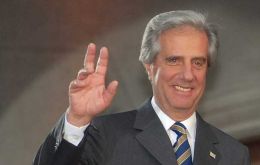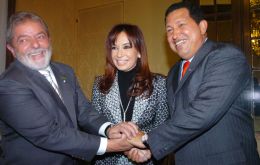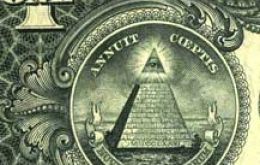MercoPress. South Atlantic News Agency
Stories for August 2008
-
Thursday, August 14th 2008 - 21:00 UTC
“Exceptional” approval rating for Uruguay's president

Uruguayan president Tabare Vazquez approval rate stands at 56%, which is considered “exceptional” for Uruguayan politics, particularly since the leader of the ruling coalition is 18 months away from the end of his five year mandate.
-
Thursday, August 14th 2008 - 21:00 UTC
Argentina: Moody downs debt 6 levels below invest grade

Argentina's foreign debt rating outlook was cut on Thursday to stable from positive by Moody's Investors Service, which cited “heightened political volatility”. This means Argentina's rating stands at B3, six levels below investment grade.
-
Thursday, August 14th 2008 - 21:00 UTC
President Chavez at peace with World Jewish Council

Venezuelan President Hugo Chavez promised a delegation of visiting Jewish leaders he would condemn “all forms of anti-Semitism.”
-
Thursday, August 14th 2008 - 21:00 UTC
Euro zone economies contract in second quarter by 0.2%

The 15 economies of the Euro zone contracted by 0.2% between April and June heightening fears the Euro area is sliding towards recession. The first decline since the Euro zone was created in 1999 was driven by a slowdown in exports and consumer spending.
-
Thursday, August 14th 2008 - 21:00 UTC
US July inflation soars to highest in almost two decades

United States consumer prices rose by 5.6% in the year to July, the fastest inflation rate for almost two decades figures show. US Labor Department reported consumer prices rose 0.8% last month after jumping 0.6% in May and 1.1% in June. The July number was double what economists had predicted.
-
Wednesday, August 13th 2008 - 21:00 UTC
US surprises: trade deficit down; budget shortfall up
Good and bad news from United States: while the June trade deficit helped by strong farm and manufacture goods exports fell to an unexpected 56.8 billion US dollars, the July federal budget deficit soared to 102.8 billion pushed by the economic stimulus payments and more outlays to protect depositors from failed banks.
-
Wednesday, August 13th 2008 - 21:00 UTC
China targets stable growth with moderate higher inflation
A major Chinese government think-tank in Shanghai has proposed raising the country's inflation target for this year and next to 5 to 7%, from the current official target for this year of 4.8%, the official China Securities Journal said on Wednesday.
-
Wednesday, August 13th 2008 - 21:00 UTC
IMF to focus country surveillance on exchange rates impacts
The International Monetary Fund said on Tuesday it will enter talks with countries whose exchange rates do not reflect economic fundamentals and cause problems for other nations and the global economy.
-
Wednesday, August 13th 2008 - 21:00 UTC
Paraguay's new government, a test for Taiwan diplomacy
Taiwan's president Ma Ying-jeou begins this week his first overseas visit to three Latinamerican countries some of the very few left in the world that still recognise the Republic of China (Taipei).
-
Wednesday, August 13th 2008 - 21:00 UTC
License for Amazon dam triggers controversy in Brazil
Brazil's environment minister Carlos Minc announced he had granted a license for an Amazon hydroelectric dam but attached stringent conditions to protect Indian reservations and nature preserves. However environmental groups anticipated a long legal battle.
